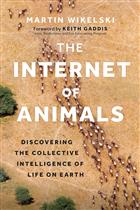The Internet of Animals: Discovering the Collective Intelligence of Life on Earth
- Publisher : Greystone Books
- Illustrations : 8 page col plate section, b/w illus
Our customers have not yet submitted a review for this title - click here to be the first to write a review
Description:
An illuminating account of animal migration and the stunning new science that reveals their infinite, untapped knowledge.
What do animals know that we don't? How do elephants detect tsunamis before they happen? How do birds predict hurricanes? In The Internet of Animals, renowned scientist Martin Wikelski convincingly argues that animals possess a unique sixth sense that humans are only beginning to grasp …
All we need to do is give animals a voice and our perception of the world could change forever. That's what author Martin Wikelski and his team of scientists believe, and this book shares their story for the first time. As they tag animals around the world with minuscule tracking devices, they link their movements to The International Space Station, which taps into the 'internet of animals': an astonishing network of information made up of thousands of animals communicating with each other and their environments. Called the International Cooperation for Animal Research Using Space, or ICARUS, this phenomenal project is poised to change our world.
Down on the ground, Wikelski describes animals' sixth sense first-hand. Farm animals become restless when earthquakes are imminent. Animals on the African plains sense when poachers are on the move. Frigatebirds in South America depart before hurricanes arrive …
As Wikelski shows, animal migratory rhythms are not triggered by genes encoded in their DNA, as previously thought, but by elaborate cultures that are long established. What does this mean for humans? It means that, by paying attention to animal cultures, we can learn more about our environments. We can better prepare for natural disasters, such as earthquakes, floods, and hurricanes. Most of all, we can learn to live alongside animals in harmony for the betterment of our future, their future, and the future of the planet.
A loving ode to science itself, told with wit and wonder. - Thor Hanson, author of Hurricane Lizards and Plastic Squid
You may also like...
Floodplain Meadows - Beauty and Utility: A Technical Handbook
Rothero, E.; Lake, S.; Gowing, D. (Eds)
Price £12.50
The Book of Wilding: A Practical Guide to Rewilding, Big and Small
Tree, I.; Burrell, C.
Price £27.50
(Save £7.50)
An Illustrated Book of Peat: The Life and Deaths of Bogs: A New Synthesis
Fenton, J.H.C.
Price £39.95
The Saltmarsh Creation Handbook: A Project Managers Guide to the Creation of
Nottage, A.S.; Robertson, P.A.
Price £29.99










